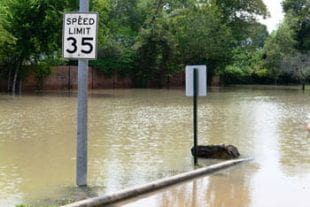Jeff Falk
713-348-6775
jfalk@rice.edu
Rice U. expert: Fight Houston area’s surge-flood threat now
Blackburn: Don’t ‘build solutions that are obsolete upon arrival’
HOUSTON – (May 7, 2019) – No issue poses a greater threat to the economic security of the Houston area than surge flooding, which could kill thousands of people and cause massive property damage, according to a new research paper by an environmental and engineering expert at Rice University’s Baker Institute for Public Policy.
The paper, “Houston-Area Surge Flooding and Its Effects on Regional and National Security,” was authored by attorney Jim Blackburn, a professor in the practice of environmental law at Rice, Baker Institute Rice Faculty Scholar and co-director of the university’s Severe Storm Prediction, Education and Evacuation from Disasters Center (SSPEED).
Surge flooding would disrupt the Houston Ship Channel, the Texas City refining complex and the Bayport Industrial District, all of which are key suppliers of the nation’s refined oil products and plastics, Blackburn said.
“The loss of production in the Galveston Bay shoreline area would profoundly affect U.S. national security, regional and local economies in Texas and people’s lives and well-being,” wrote Blackburn, whose paper outlines the challenge and identifies possible solutions to mitigate surge flooding.
“The failure to talk honestly and directly about climate change is a major problem that could lead to the deaths of thousands of people, harm to the national economy and destruction of a key economic engine for the region,” Blackburn wrote. “Kathryn Hayhoe, a climate scientist at Texas Tech University, has stated that we are charting our course forward by ‘driving using our rearview mirror.’ The past is not a good predictor of the future when it comes to the size of these storms and their potential damage. If we simply plan for the past, we will not solve this issue.”
Blackburn said the available tools that engineers and scientists use to evaluate severe storm situations are deficient.
“The tools were not developed to address today’s problems,” he wrote. “For example, the U.S. Army Corps of Engineers is bound by regulations to utilize cost-benefit analysis and to integrate the results of past storms to develop the best proposal for mitigating future storm damage. This methodology was not designed to address a changing climate and more intense storms. The issue here is that this methodology is mandated at the national level. It is worrisome that the U.S. Army Corps of Engineers would recommend a project (the Coastal Spine, also known as the ‘Ike Dike’) costing $14 billion to $20 billion that does not protect the region from a larger storm that is certainly foreseeable.”
The SSPEED Center is not constrained by such outdated methodology when modeling hurricane-surge flooding, Blackburn said. The center’s approach is “based on identifying a reasonable worst-case storm and attempting to develop alternatives to address the resulting surge and flooding issues,” he wrote. “The storm modeled using this approach is roughly a 250-year storm. With our changing storm intensity and size, we will easily see one or more storms of this magnitude in the next 50 years. Perhaps encouraging more flexibility in federal methods of calculation would generate better results from a national security and human protection standpoint.”
Blackburn said it is reasonable to incorporate multiple tasks into a surge-flooding solution.
“Surge problems exist in every coastal community on the Gulf Coast and the Atlantic, so there are competing needs for money everywhere in the country,” he wrote. “To dedicate huge amounts of money to single-purpose projects may be a luxury the country cannot afford any longer. In the case of Galveston Bay, solutions exist that combine surge-flood abatement, navigation enhancement and recreation. All alternatives should be tasked with integrating solutions to multiple problems where possible, such as in the Galveston Bay Park Plan.”
Urgency is an issue, Blackburn said. Of the two alternatives discussed in his paper, the Coastal Spine is projected for completion in 2035 and the Galveston Bay Park Plan in 2027.
“Implementing these measures sooner could be very important in protecting the region and national security,” Blackburn wrote. “Sea level is rising, the storms are getting larger and the clock is ticking.
“The problems facing Houston and the United States are serious and must be addressed effectively,” Blackburn concluded. “We cannot afford to build solutions that are obsolete upon arrival. We cannot afford to ignore issues because they are uncomfortable, and we cannot continue business as usual and expect to solve the incredible problems associated with hurricane-surge flooding.”
-30-
To interview Blackburn, contact Jeff Falk, associate director of national media relations at Rice, at jfalk@rice.edu or 713-348-6775.
Follow the Baker Institute via Twitter @BakerInstitute.
Follow Rice News and Media Relations via Twitter @RiceUNews.
Related materials:
Paper: www.bakerinstitute.org/media/files/files/a504bad8/bi-research-blackburn-houstonflooding-050119.pdf
Blackburn bio: www.bakerinstitute.org/experts/jim-blackburn
Founded in 1993, Rice University’s Baker Institute ranks among the top three university-affiliated think tanks in the world. As a premier nonpartisan think tank, the institute conducts research on domestic and foreign policy issues with the goal of bridging the gap between the theory and practice of public policy. The institute’s strong track record of achievement reflects the work of its endowed fellows, Rice University faculty scholars and staff, coupled with its outreach to the Rice student body through fellow-taught classes — including a public policy course — and student leadership and internship programs. Learn more about the institute at www.bakerinstitute.org or on the institute’s blog, http://blogs.chron.com/bakerblog.


